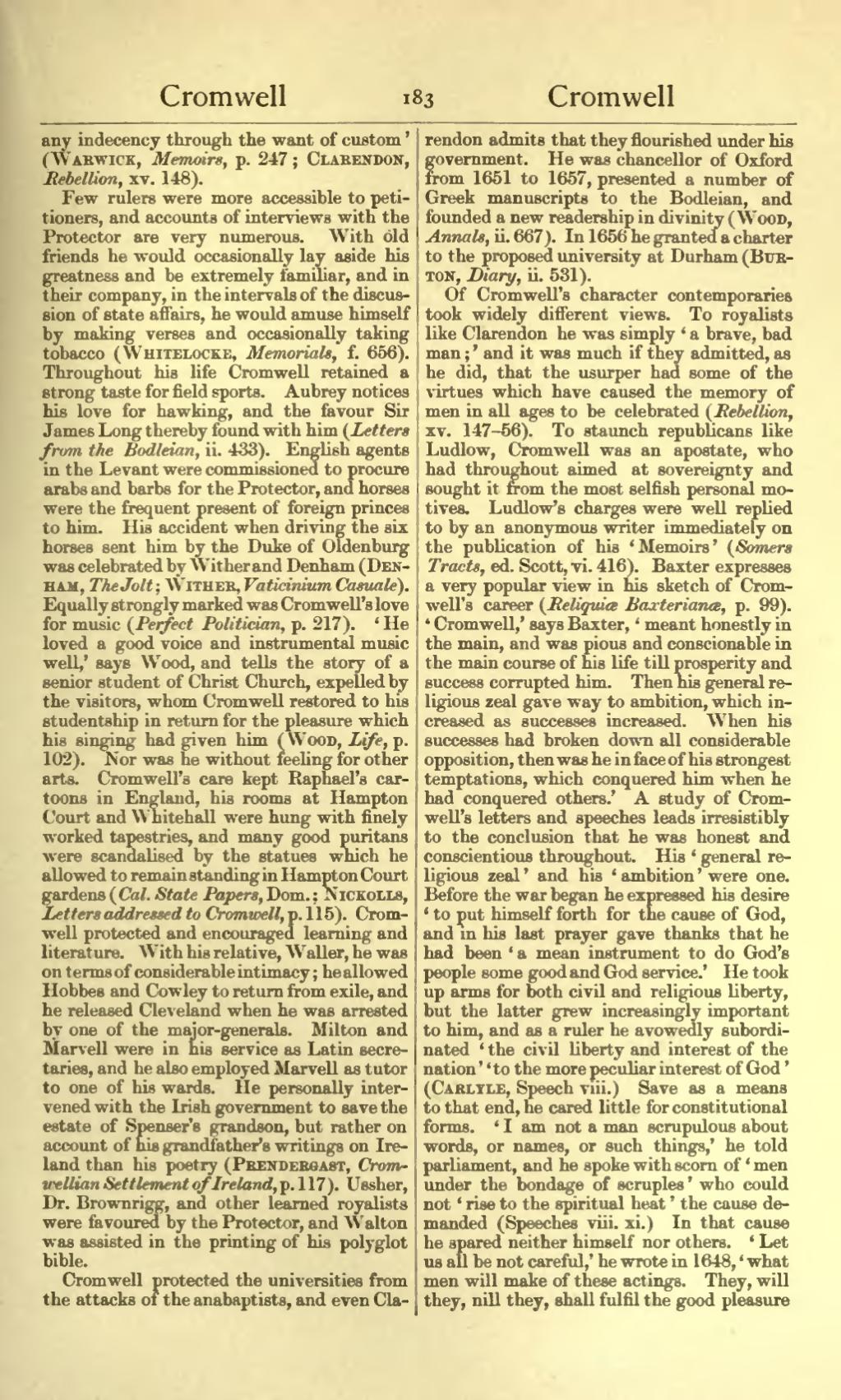any indecency through the want of custom’ (Warwick, Memoirs, p. 247; Clarendon, Rebellion, xv. 148).
Few rulers were more accessible to petitioners, and accounts of interviews with the Protector are very numerous. With old friends he would occasionally lay aside his greatness and be extremely familiar, and in their company, in the intervals of the discussion of state affairs, he would amuse himself by making verses and occasionally taking tobacco (Whitelocke, Memorials, f. 656). Throughout his life Cromwell retained a strong taste for field sports. Aubrey notices his love for hawking, and the favour Sir James Long thereby found with him (Letters from the Bodleian, ii. 433). English agents in the Levant were commissioned to procure arabs and barbs for the Protector, and horses were the frequent present of foreign princes to him. His accident when driving the six horses sent him by the Duke of Oldenburg was celebrated by Wither and Denham (Denham, The Jolt; Wither, Vaticinium Casuale). Equally strongly marked was Cromwell’s love for music (Perfect Politician, p. 217). ‘He loved a good voice and instrumental music well,’ says Wood, and tells the story of a senior student of Christ Church, expelled by the visitors, whom Cromwell restored to his studentship in return for the pleasure which his singing had given him (Wood, Life, p. 102). Nor was he without feeling for other arts. Cromwell’s care kept Raphael’s cartoons in England, his rooms at Hampton Court and Whitehall were hung with finely worked tapestries, and many good puritans were scandalised by the statues which he allowed to remain standing in Hampton Court gardens (Cal. State Papers, Dom.: Nicholls, Letters addressed to Cromwell, p. 115). Cromwell protected and encouraged learning and literature. With his relative, Waller, he was on terms of considerable intimacy; he allowed Hobbes and Cowley to return from exile, and he released Cleveland when he was arrested by one of the major-generals. Milton and Marvell were in his service as Latin secretaries, and he also employed Marvell as tutor to one of his wards. He personally intervened with the Irish government to save the estate of Spenser’s grandson, but rather on account of his grandfather’s writings on Ireland than his poetry (Prendergast, Cromwellian Settlement of Ireland, p. 117). Ussher, Dr. Brownrigg, and other learned royalists were favoured by the Protector, and Walton was assisted in the printing of his polyglot bible.
Cromwell protected the universities from the attacks of the anabaptists, and even Clarendon admits that they flourished under his government. He was chancellor of Oxford from 1601 to 1667, presented a number of Greek manuscripts to the Bodleian, and founded a new readership in divinity (Wood, Annals, ii. 667). In 1656 he granted a charter to the proposed university at Durham (Burton, Diary, ii. 631).
Of Cromwell’s character contemporaries took widely different views. To royalists like Clarendon he was simply ‘a brave, bad man;’ and it was much if they admitted, as he did, that the usurper had some of the virtues which have caused the memory of men in all ages to be celebrated (Rebellion, xv. 147–66). To staunch republicans like Ludlow, Cromwell was an apostate, who had throughout aimed at sovereignty and sought it from the most selfish personal motives. Ludlow’s charges were well replied to by an anonymous writer immediately on the publication of his ‘Memoirs’ (Somers Tracts, ed. Scott, vi. 416). Baxter expresses a very popular view in his sketch of Cromwell’s career (Reliquæ Baxterianæ, p. 99). ‘Cromwell,’ says Baxter, ‘meant honestly in the main, and was pious and conscionable in the main course of his life till prosperity and success corrupted him. Then his general religious zeal gave way to ambition, which increased as successes increased. When his successes had broken down all considerable opposition, then was he in face of his strongest temptations, which conquered him when he had conquered others.’ A study of Cromwell’s letters and speeches leads irresistibly to the conclusion that he was honest and conscientious throughout. His ‘general religious zeal’ and his ‘ambition’ were one. Before the war began he expressed his desire to put himself forth for the cause of God, and in his last prayer gave thanks that he had been ‘a mean instrument to do God’s people some good and God service.’ He took up arms for both civil and religious liberty, but the latter grew increasingly important to him, and as a ruler he avowedly subordinated ‘the civil liberty and interest of the nation’ ‘to the more peculiar interest of God’ (Carlyle, Speech viii.) Save as a means to that end, he cared little for constitutional forms. ‘I am not a man scrupulous about words, or names, or such things,’ he told parliament, and he spoke with scorn of ‘men under the bondage of scruples’ who could not ‘rise to the spiritual heat’ the cause demanded (Speeches viii. xi.) In that cause he spared neither himself nor others. ‘Let us all be not careful,’ he wrote in 1648, ‘what men will make of these actings. They, will they, nill they, shall fulfil the good pleasure
